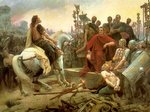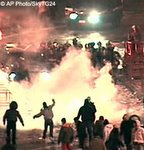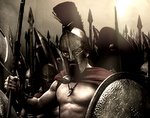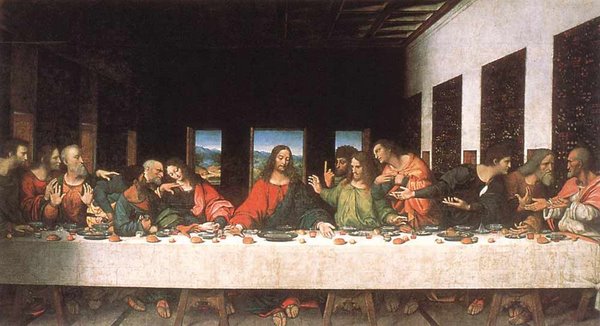
So for the next few posts what I'm going to be doing is re-posting some of the notes I wrote on Facebook, mainly just toget them out into the open internet and see if anyone wants to comment on them further. With that in mind, here are my musings on military power as the guarantee of political sovereignty:
Many of Machiavelli's ideas have alot of significance in the modern world, making me speculate about the time machine he had hidden in his barn a few miles outside of Florence...let me show you what I mean.
"In my judgement the prince will be able to take care of himself if he has a sufficent supply of men or of money to put an adquate army in the field, capable of engaging anyone likely to attack him"
What Machiavelli has just described is the only realistic way for a modern nation state to retain its sovereignty. In fact, without sufficient military force, a state's actual claim to soveriegnty is questionable at best. Just look at current examples of Palestine, Iraq, and Afghanistan. None of them had a strong enough military to retain sovereign power over their domains, and are now in pretty bad shape. Conversely, observe Israel. Over the last fifty years Israel has been invaded on numerous occasions, and yet has repulsed them by sheer military power. Clearly, the army is what guarantees a nation's ability to rule itself without bending over to foreign powers. Even if it never has to fight, its mere existence is often enough to convince beligerent powers that invasion or coercion would be costly and difficult. This, I suspect, is why nobody has yet invaded North Korea.
Now, you may be wondering "what about peaceful states like Canada, or small ones like Monaco? They don't have huge militaries and they retain their sovereignty just fine." I disagree. Direct military rule is not the only measure of power over a neighbouring nation. What matters is the ability to project your military into foreign states. America is living proof that a nation has power over any other nation that it can successfully invade. With this said, any sovereignty claimed by weaker powers can thus be seen as either imagined, insubstantial, or illusory. What I mean here is this: Monaco would cease to be a soveriegn state the second France decided to take it over. Similarly, Canada would cease to be soveriegn the second America decided to invade. Therefore, though states without large armies may exercise sovereign authority within their own geographical spaces, their real power is limited by the ability of other states to conquer them, whether they decide to invade or not. The fact that their military powed CAN be projected onto weaker states makes any claims by those weaker states to TRUE sovereignty questionable at best.
You also may be wondering "What about states that protect themselves through alliances with larger powers or collective military pacts like NATO?" Well, good old Niccolo forsaw this one as well. When you make an aliiance with a stronger state -or a group of states- in order to protect your soveriegnty, you are in fact immediately losing it. By relying on another nation to defend yours, you give them the final say in matters of your own power. What if they decide not to protect you? What if they prove unable to protect you? Since both these situations would ultimately be under the control of the nation meant to defend you, they become the real holders of your state's power. How can you claim sovereignty when the death of your nation can be determined by another? What IS sovereignty if not the monopoly over violence within a clearly defined geographical area? If that monopoly belongs to another then you, in actual fact, hold no real power within your own nation. Again, you may exercise power, but if your protector decides to deprive you of it, then they are actually the ones with sovereignty over your state.
One final quote is necessary:"A prince must have no other objective, no other thought, nor take up any profession but that of war, its methods and its discipline, for that is the only art expected of a ruler." Thus, if a ruler cannot maintain sovereignty, then he is not a true ruler at all.So, as it turns out, Machiavelli's belief that a strong military is the only universally effective way to hold onto an individual state's sovereignty is actually true in the world we live in at the current time.
So ask yourself this: Did this poor Florentine clerk have a time machine? or a crystal ball? or was he just infinitely more perceptive than the political thinkers of our day? I'd choose the latter. But hey, he could have had a time machine....
Many of Machiavelli's ideas have alot of significance in the modern world, making me speculate about the time machine he had hidden in his barn a few miles outside of Florence...let me show you what I mean.
"In my judgement the prince will be able to take care of himself if he has a sufficent supply of men or of money to put an adquate army in the field, capable of engaging anyone likely to attack him"
What Machiavelli has just described is the only realistic way for a modern nation state to retain its sovereignty. In fact, without sufficient military force, a state's actual claim to soveriegnty is questionable at best. Just look at current examples of Palestine, Iraq, and Afghanistan. None of them had a strong enough military to retain sovereign power over their domains, and are now in pretty bad shape. Conversely, observe Israel. Over the last fifty years Israel has been invaded on numerous occasions, and yet has repulsed them by sheer military power. Clearly, the army is what guarantees a nation's ability to rule itself without bending over to foreign powers. Even if it never has to fight, its mere existence is often enough to convince beligerent powers that invasion or coercion would be costly and difficult. This, I suspect, is why nobody has yet invaded North Korea.
Now, you may be wondering "what about peaceful states like Canada, or small ones like Monaco? They don't have huge militaries and they retain their sovereignty just fine." I disagree. Direct military rule is not the only measure of power over a neighbouring nation. What matters is the ability to project your military into foreign states. America is living proof that a nation has power over any other nation that it can successfully invade. With this said, any sovereignty claimed by weaker powers can thus be seen as either imagined, insubstantial, or illusory. What I mean here is this: Monaco would cease to be a soveriegn state the second France decided to take it over. Similarly, Canada would cease to be soveriegn the second America decided to invade. Therefore, though states without large armies may exercise sovereign authority within their own geographical spaces, their real power is limited by the ability of other states to conquer them, whether they decide to invade or not. The fact that their military powed CAN be projected onto weaker states makes any claims by those weaker states to TRUE sovereignty questionable at best.
You also may be wondering "What about states that protect themselves through alliances with larger powers or collective military pacts like NATO?" Well, good old Niccolo forsaw this one as well. When you make an aliiance with a stronger state -or a group of states- in order to protect your soveriegnty, you are in fact immediately losing it. By relying on another nation to defend yours, you give them the final say in matters of your own power. What if they decide not to protect you? What if they prove unable to protect you? Since both these situations would ultimately be under the control of the nation meant to defend you, they become the real holders of your state's power. How can you claim sovereignty when the death of your nation can be determined by another? What IS sovereignty if not the monopoly over violence within a clearly defined geographical area? If that monopoly belongs to another then you, in actual fact, hold no real power within your own nation. Again, you may exercise power, but if your protector decides to deprive you of it, then they are actually the ones with sovereignty over your state.
One final quote is necessary:"A prince must have no other objective, no other thought, nor take up any profession but that of war, its methods and its discipline, for that is the only art expected of a ruler." Thus, if a ruler cannot maintain sovereignty, then he is not a true ruler at all.So, as it turns out, Machiavelli's belief that a strong military is the only universally effective way to hold onto an individual state's sovereignty is actually true in the world we live in at the current time.
So ask yourself this: Did this poor Florentine clerk have a time machine? or a crystal ball? or was he just infinitely more perceptive than the political thinkers of our day? I'd choose the latter. But hey, he could have had a time machine....



















1 comment:
Good words.
Post a Comment